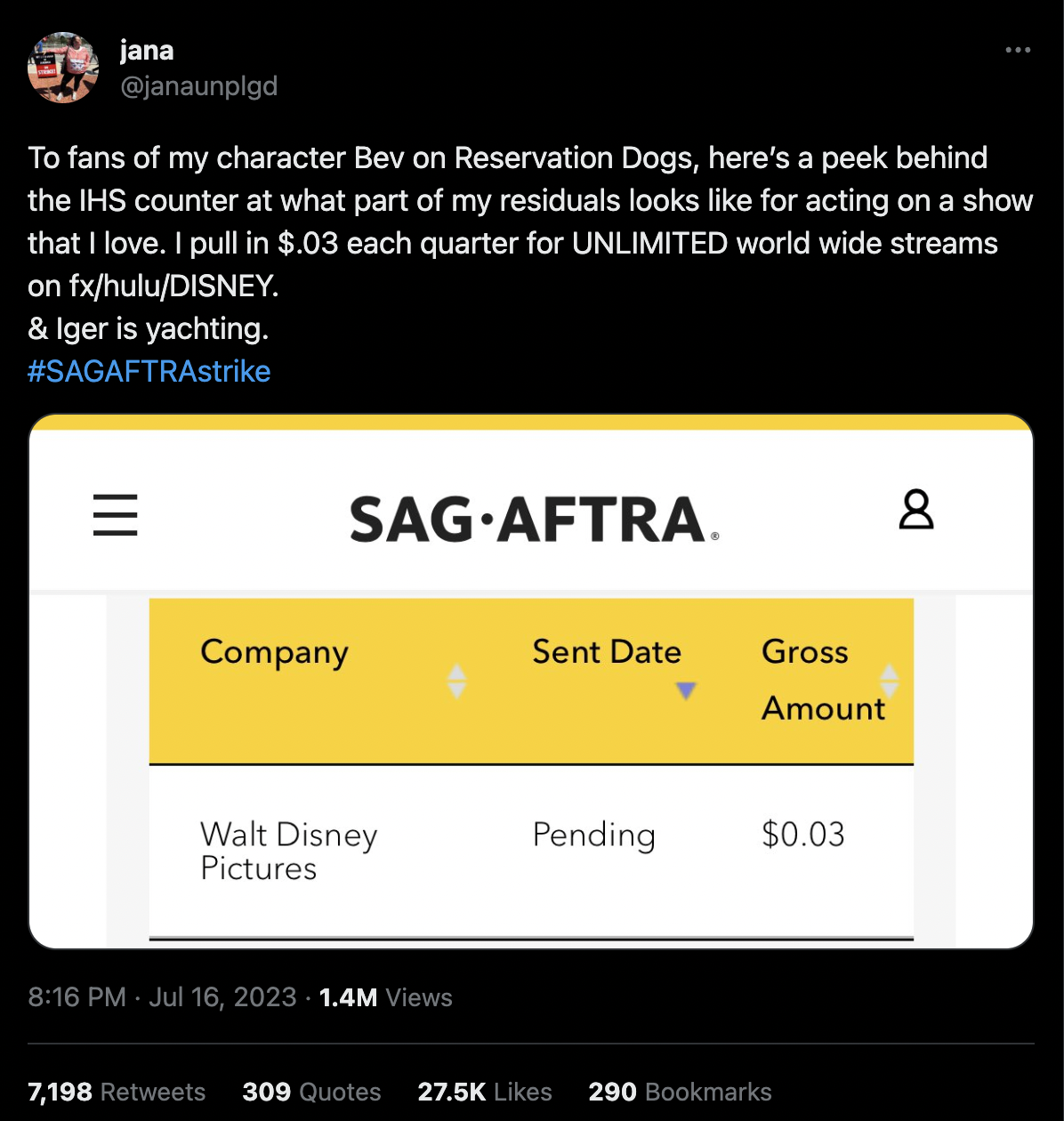
- Details
- By Neely Bardwell
On May 2nd, the Writers Guild of America, which represents around 11,500 screenwriters, went on strike. Then, this past Friday, the Screen Actors Guild–American Federation of Television and Radio Artists voted to join them.
The strike has brought popular TV shows and movies like Cobra Kai, House of the Dragon, Saturday Night Live, Stranger Things, and more to a screeching halt. Strike demonstrations are happening coast to coast, with thousands outside the major studios housed in California and offices in New York City. Their goal? A fair and equitable contract.
The writers and actors unions (WGA and SAG-AFTRA, respectively) argue that they are not paid enough, and feel that they and their work are not valued. Many are barely making poverty-level salaries, with very low wages in streaming services.
Jana Schmieding (Lakota), an actress on Reservation Dogs and Rutherford Falls, shared her residual check to social media to show the pay discrepancies.
“To fans of my character Bev on Reservation Dogs, here’s a peek behind the IHS counter at what part of my residuals looks like for acting on a show that I love. I pull in $.03 each quarter for UNLIMITED world wide streams on fx/hulu/DISNEY. & Iger is yachting,” Schmieding tweeted on July 16.
There is a concern about the devaluation of human-created content due to the rise in artificial intelligence, as studios rely increasingly on cheap AI to create content.
Writers and actors want to be fairly compensated for their work, and they want their work, a uniquely human art form, to be valued.
Early this summer, a casting call was released looking for Native women in Long Island, NY to work as a “scan talent performer”. They were offering $438 for four hours of work for just one day. It was not covered by SAG-AFTRA or any other union contract.
"Work will consist of making facial expressions while talent’s face is scanned using high tech cameras. Talent’s faces will then be added to large library for creating various roles,” the casting call said.
Bob Iger, the CEO of Disney, came out in opposition to the strike during an appearance on CNBC’s “Squawk Box” last week, saying the writers and actors unions going on strike are not being “realistic” with their expectations, and calling the strike “disruptive” and “disturbing”.
Iger makes a reported annual salary of $27 million, and has a current net worth of $250 million.
Elva Guerra, who plays Jackie on Reservation Dogs, stands in solidarity with the strike, as they believe their experience with Hollywood is “one of many” and says this strike is long overdue.
The writers and actors of Reservation Dogs, with its fifth and final season about to be released, are no longer participating in the promotion of the show, as they too are supporting the strike.
“Art comes in many different forms of media,” Guerra told Native News Online via email. “I love that I can create freely, but I’m just trying to make it day by day like everyone else is, truly. It’s only been a few years since I’ve started but I can confidently say that there is a complete divide between people who get compensated fairly versus unfairly. Being treated fairly is a basic human principle.”
More Stories Like This
Zuni Youth Enrichment Project Takes Top Emerging Artist Apprentices to Phoenix for Artistic Exploration and Cultural ImmersionFrom Dishwasher to Award-Winning Chef: Laguna Pueblo's Josh Aragon Serves Up Albuquerque's Best Green Chile Stew
Rob Reiner's Final Work as Producer Appears to Address MMIP Crisis
Vision Maker Media Honors MacDonald Siblings With 2025 Frank Blythe Award
First Tribally Owned Gallery in Tulsa Debuts ‘Mvskokvlke: Road of Strength’
Help us defend tribal sovereignty.
At Native News Online, our mission is rooted in telling the stories that strengthen sovereignty and uplift Indigenous voices — not just at year’s end, but every single day.
Because of your generosity last year, we were able to keep our reporters on the ground in tribal communities, at national gatherings and in the halls of Congress — covering the issues that matter most to Indian Country: sovereignty, culture, education, health and economic opportunity.
That support sustained us through a tough year in 2025. Now, as we look to the year ahead, we need your help right now to ensure warrior journalism remains strong — reporting that defends tribal sovereignty, amplifies Native truth, and holds power accountable.
 The stakes couldn't be higher. Your support keeps Native voices heard, Native stories told and Native sovereignty defended.
The stakes couldn't be higher. Your support keeps Native voices heard, Native stories told and Native sovereignty defended.
Stand with Warrior Journalism today.
Levi Rickert (Potawatomi), Editor & Publisher

